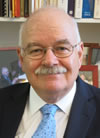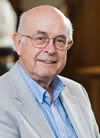“Nostra Aetate and the Future of Interreligious Dialogue”

Sunday, October 11 to
Tuesday, October 13, 2015
University of Wisconsin–Madison
In 1965, the assembled bishops of the Second Vatican Council passed the “Declaration on the Relation of the Church with Non-Christian Religions,” commonly known as Nostra Aetate (after the opening words, “In our time…”). It constituted a major statement about how the Roman Catholic Church under Pope Paul VI considered its relationship to other faith traditions, notably Judaism, Islam, Hinduism, and Buddhism. The document announced that the Church “rejects nothing that is true and holy in these religions” and “reproves, as foreign to the mind of Christ, any discrimination against men or harassment of them because of their race, color, condition of life, or religion.”
To mark the Declaration’s fiftieth anniversary, this conference will examine the past—and potential future—of Nostra Aetate from multiple perspectives, primarily from outside the Roman Catholic Church. The Declaration transformed the Church’s relationships with Judaism through an exculpation of the Jews for the murder of Jesus Christ and its seminal assertion that “the Jews should not be presented as rejected or accursed by God, as if this followed from the Holy Scriptures.” It opened spaces for initiatives such as A Common Word, a 2007 joint statement on interfaith dialogue by dozens of Muslim and Christian leaders and scholars. As befitting our mission “to create better understanding of the Abrahamic traditions and their interrelationships by encouraging ongoing discussion of these traditions,” the Lubar Institute has invited extraordinary scholars to come together to explore and reflect upon the global significance of Nostra Aetate.
We are deeply honored to have this conference anchored by two plenary addresses, presented by Dr. John Borelli, Special Assistant for Interreligious Initiatives to the President of Georgetown University, and by Paul Knitter, Paul Tillich Professor Emeritus, Union Theological Seminary. Please join us for these lectures and the full slate of public panels.
[Dan Hummel, a University of Wisconsin–Madison Ph.D. candidate, attended this conference and provided this analysis of the event to the blog “Religion in American History” (October 23, 2015).]
Plenary Addresses
 Sunday, October 11, 7:30 pm to 9:30 pm
Sunday, October 11, 7:30 pm to 9:30 pm
Contextualizing Nostra Aetate: Its Vatican II Origins and its Future for Today
Dr. John Borelli, Special Assistant for Interreligious Initiatives to the President of Georgetown University; and the U.S. Jesuit Conference’s Coordinator for Interreligious Dialogue and Relations.
location: Upper|House, 365 East Campus Mall #200.
 Monday, October 12, 7:30 pm to 9:30 pm
Monday, October 12, 7:30 pm to 9:30 pm
Religious Pluralism as the Great Challenge of the Twenty-First Century
Dr. Paul Knitter, Emeritus Paul Tillich Professor of Theology, Union Theological Seminary; and Honorary Fellow, Lubar Institute
location: VandeBerg Auditorium, 121 Pyle Center, 702 Langdon St.
All panels (listed below) will be in Room 235, Pyle Center, 702 Langdon St.
MONDAY, OCTOBER 12, 2015
Panel 1: Roman Catholic Perspectives
[10:15 am to 12:00 pm]
moderator: Prof. Giuliana Chamedes,
Assistant Professor of History, Department of History, University of Wisconsin–Madison
- Prof. Jeannine Hill Fletcher, Professor of Theology, Fordham University
Foreign to the Mind of Christ: Nostra Aetate in America’s Religio-Racial Project - Dr. Roger Haight, S.J., Scholar in Residence, Union Theological Seminary
The Christian Spiritual Vision from the Perspective of Nostra Aetate - Prof. John Pawlikowski, O.S.M., Professor of Social Ethics and Director of Catholic-Jewish Studies Program, Catholic Theological Union
Towards a Renewed Theology of Christianity’s Bond with Judaism
Panel 2: Protestant and Orthodox Christian Perspectives
[1:30 pm to 3:00 pm]
moderator: Dr. Susan Ridgely,
Assistant Professor of Religious Studies, Department of Religious Studies, University of Wisconsin–Oshkosh
- Dr. Peter Bouteneff, Professor of Systematic Theology, St. Vladimir’s Orthodox Theological Seminary
Nostra Aetate: Views from a Sibling - Prof. Dwight Hopkins, Professor of Theology, University of Chicago Divinity School
One Protestant and Justice: Reflections on Nostra Aetate - Dr. Ulrich Rosenhagen, Associate Director of the Lubar Institute for the Study of the Abrahamic Religions; Lecturer in Religious Studies, University of Wisconsin–Madison
Israel’s Continued Chosenness and God’s Many Names: Protestant Theological Responses to Nostra Aetate
Panel 3: Jewish Perspectives
[3:30 pm to 5:00 pm]
moderator: Dr. Philip Hollander,
Assistant Professor of Israeli Literature and Culture, Center for Jewish Studies, University of Wisconsin–Madison
- Dr. Shira L. Lander, Professor of Practice and Director of Jewish Studies, Southern Methodist University
Lot’s Wife: On the Dangers of Looking Back - Rabbi Or Rose, Director, Center for Global Judaism, Hebrew College
Restless Spirits: Thomas Merton, Reb Zalman, and Interreligious Friendship
- Rabbi David Fox Sandmel, Director of Interfaith Affairs, Anti-Defamation League
“Who do you say that I am?” What Can Jews Say about Jesus and Christianity in the Light of Nostra Aetate and Contemporary Jewish-Christian Relations?
TUESDAY, OCTOBER 13, 2015
Panel 4: Islamic Perspectives
[8:30 am to 10:00 am]
moderator: Prof. Uli Schamiloglu,
Professor of Central Asian Studies, Department of Languages and Cultures of Asia, University of Wisconsin–Madison
- Dr. Riffat Hassan, Professor Emerita, University of Louisville
Islamic Perspectives on Interreligious Dialogue in the Light of Nostra Aetate - Dr. Jerusha T. Lamptey, Assistant Professor of Islam and Ministry; and Director of the Islam, Social Justice and Interreligious Engagement Program, Union Theological Seminary
Beyond the Rays of Truth?: Nostra Aetate, Islam, and the Value of Difference - Dr. Muhammad Shafiq, Professor of World Religions and Islamic Studies; and Executive Director of the Brian and Jean Hickey Center for Interfaith Studies and Dialogue Nazareth College
Islamic Perspectives on Interreligious Relationships in the Light of Nostra Aetate
Panel 5: Buddhist and Hindu Perspectives
[10:30 am to 12:00 pm]
moderator: Prof. John Dunne
Center for Healthy Minds Distinguished Professor in Contemplative Humanities, Department of East Asian Languages & Literature, University of Wisconsin–Madison
- Dr. Rita Gross, Professor Emerita, Department of Philosophy and Religious Studies, University of Wisconsin–Eau Claire
A Buddhist Response to Nostra Aetate - Dr. Sallie B. King, Professor Emerita, Department of Philosophy and Religion, James Madison University; and Professor, Department of Theology, Georgetown University
Buddhism and Christianity in a Globalizing and Supplementing World - Dr. Jeffery D. Long, Professor of Religion and Asian Studies, Department of Religious Studies, Elizabethtown College
The Eternal Veda and the Truth which Enlightens All: Correspondences and Disjunctures between Nostra Aetate and Swami Vivekananda’s Vedantic Inclusivism
Panel 6: Nostra Aetate and the Future
[1:30 pm to 3:00 pm]
moderator: Prof. Charles Cohen
Director, Lubar Institute for the Study of the Abrahamic Religions; and E. Gordon Fox Professor of American Institutions, Department of History, University of Wisconsin–Madison
- Dr. Jennifer Howe Peace, Associate Professor of Interfaith Studies, Andover Newton Theological School
In Our Time: Coformation as a Modality for Interreligious Teaching and Learning - Dr. Leonard Swidler, Professor of Catholic Thought and Interreligious Dialogue, Department of Religion; and Founder and Director, Dialogue Institute, Temple University
Vatican II: The Catholic Revolution From Damnation To Dialogue! - Prof. John J. Thatamanil, Associate Professor of Theology and World Religions, Union Theological Seminary
Learning From (and Not Just About) Our Religious Neighbors: Comparative Theology and the Future of Nostra Aetate
